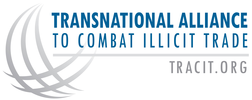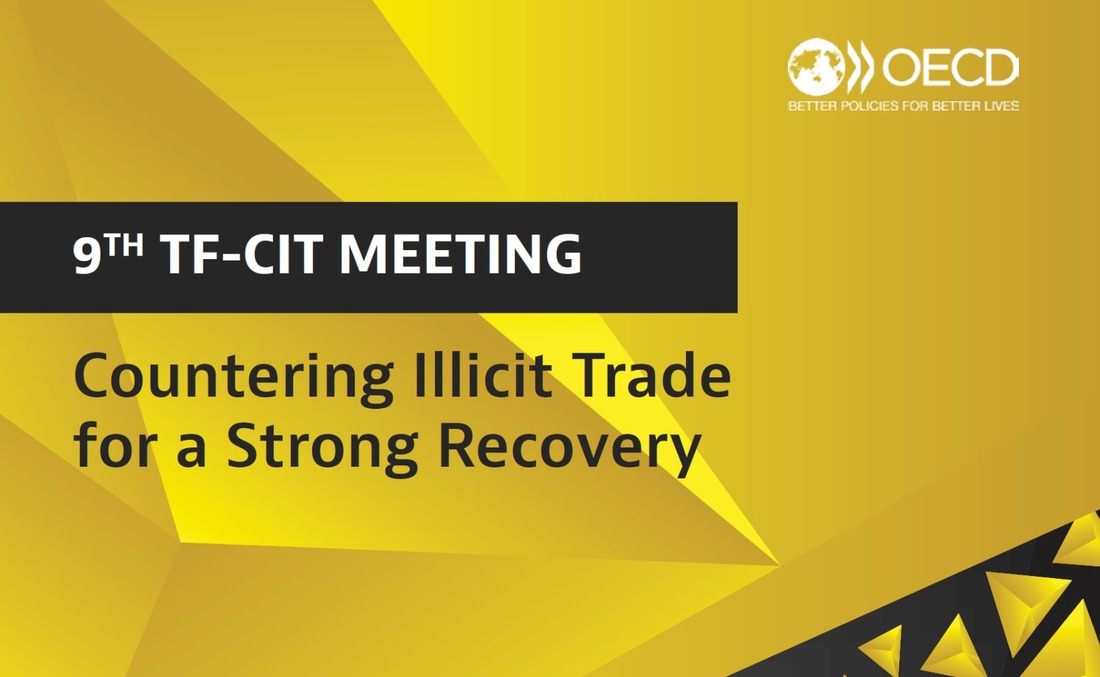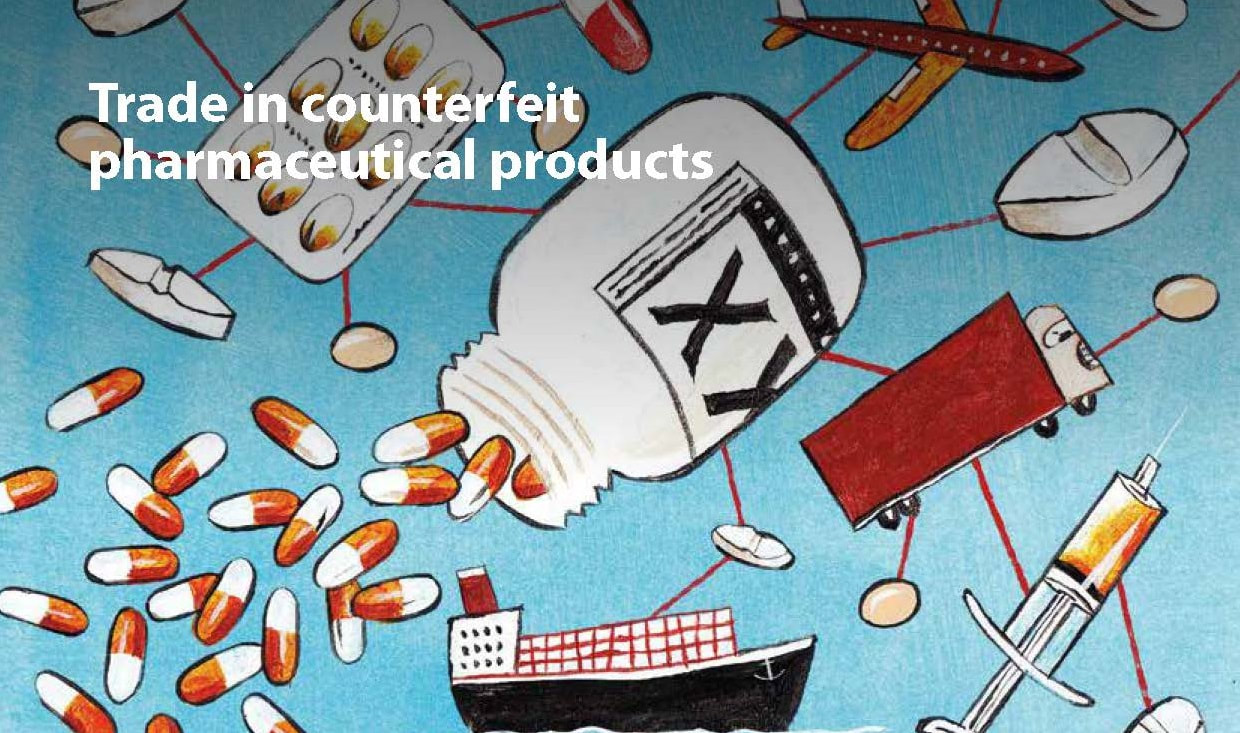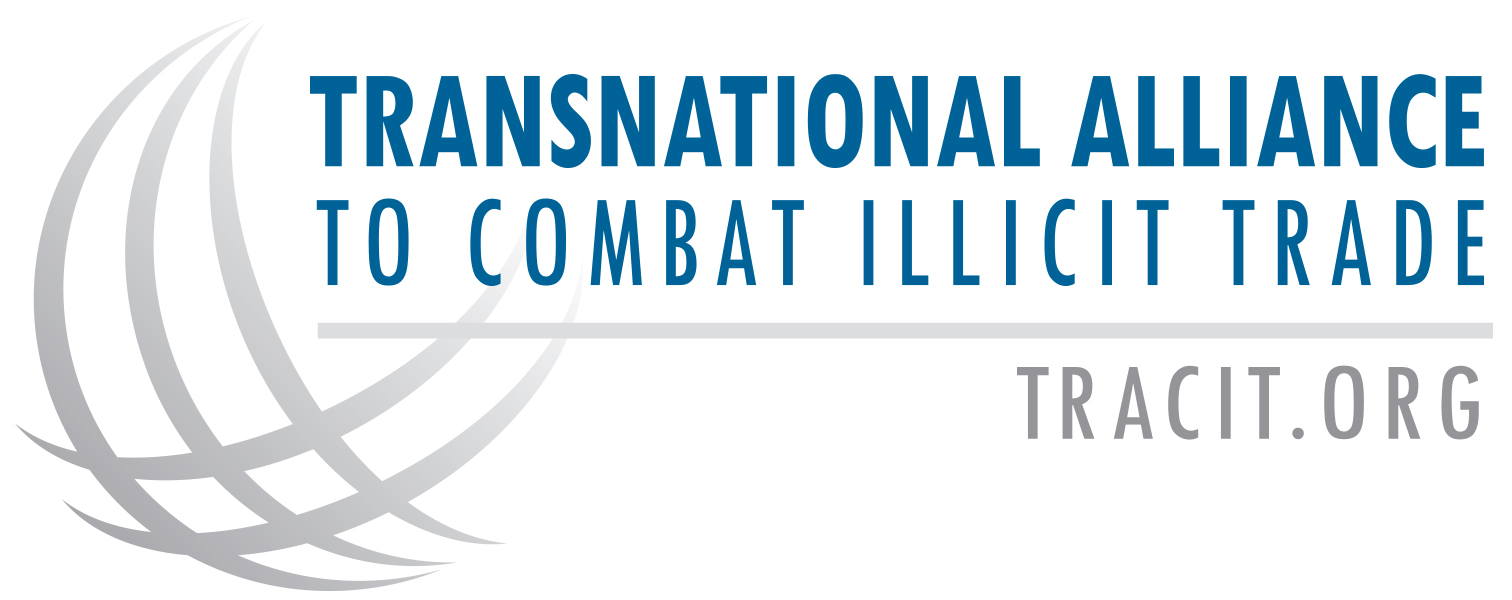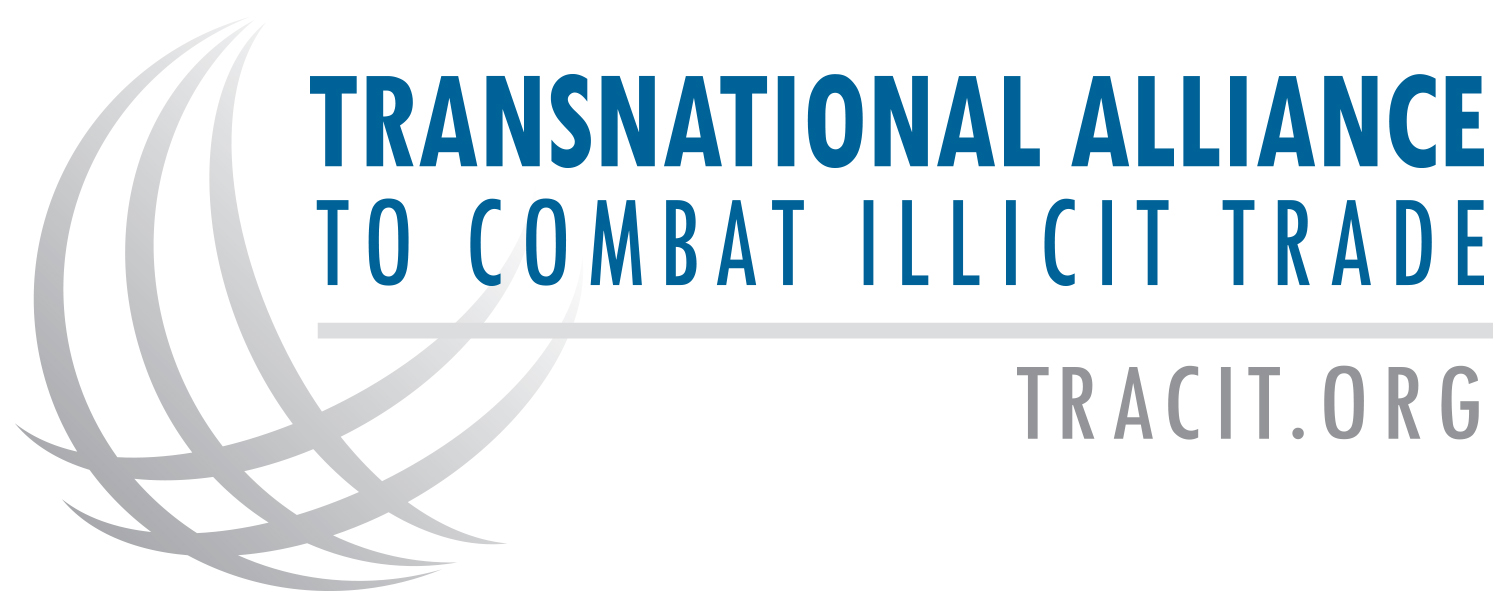The new report shows that containerships carry more than half of all seized counterfeits and provides an urgent and compelling need for governments to set new standards for mitigating the abuse of international maritime shipping lines by illicit traders.
The Task Force meeting also addressed high-risk areas of the economy—pharmaceuticals, alcohol, food, tobacco and counterfeiting online—that were particularly impacted by illicit trade during the pandemic, and the need to evaluate best practices to improve regulations and mitigate the problem. Moving forward, TRACIT believes the Task Force should build upon the impressive body of quantitative work to more effectively deliver on its High Level Risk Forum mandate to ‘design and promote good practices in public policies as a means to reduce and deter trafficking and smuggling activities,’ and to map policies and practices and develop metrices on the governance gaps that foster illicit trade. This includes cultivating the work of the task force within OECD member governments – to ensure that work is directed to the right national agencies and that messages and guidance properly percolate throughout national capitals. For example, the OECD Council’s Recommendation on Countering Illicit Trade: Enhancing Transparency in Free Trade Zones contains much-needed guidance for OECD member states. Success here will depend on work engagement, adoption and implementation by OECD governments. The OECD has changed the game here, now it’s time from member state to see it through. The Task Force should also look at ways to increase engagement and share its experience with non-OECD Member States that value the expertise of the OECD and look to it for leadership and guidance. This includes regions such as ASEAN, which is in the process of addressing illicit trade and establishing its own policy standards. Finally, I was pleased by the continued engagement with the private sector - especially those legitimate industry players most impacted by illicit trade. Industry partners represented by the Anti Illicit Trade Expert Group of the Business at OECD share the common goal of countering illicit trade and provide critical market knowledge, supply chain expertise and technical innovation. The ongoing public-private sector dialogue ensures a more effective approach to countering illicit trade by balancing incentive setting, taking into account industry-specific sensitivities and competitive advantages on private and public sides. If there is one thing we have learned from the Task Force’s work and accomplishments over the last nine years is that mitigating the cross-sectoral challenge of illicit trade is going to require an international, coordinated, response by all affected parties – and a lot of hard work! Jeffrey Hardy Director-General, TRACIT I’d like to draw your attention to a new study on Illicit Trade in Fake Pharmaceuticals. It was published today by the OECD Task Force on Countering Illicit Trade (TF-CIT) and the European Union Intellectual Property Office (EUIPO). It shows that international trade in counterfeit pharmaceuticals reached USD 4.4 billion, representing 2.2 % of trade in pharmaceuticals. The report arrives at a particularly disquieting, yet very relevant time. In the midst of people taking extreme steps to stay safe from the Covid-19 virus, we are being exposed to waves of counterfeit and falsified Covid-19 masks, hydro alcoholic gels, testing kits and possible treatments.
This is an upsetting example of the extreme steps counterfeiters will take to profit from the misfortune of others. And it is an urgent reminder that governments must step up enforcement against illicit pharmaceuticals. The OECD and EUIPO report certainly presents a compelling imperative to protect patients, healthcare systems and the wider society from the negative impacts of ingesting substandard, falsified, unregistered and unlicensed medical products. With this body of work, policymakers now understand the nature and scale, the size and scope, the shock and horror of illicit trade. But is OECD willing to follow up by evidencing a strong international policy framework that will provide meaningful tools to governments—inside and outside OECD—to help them clamp down on illicit trade in pharmaceuticals? TRACIT thinks that it is incumbent on the OECD Task Force to Counter Illicit Trade to identify, analyze and disseminate effective policy and good practices to assist OECD member states to better regulate illicit trade in pharmaceuticals. This is fully consistent with the organization’s mandate to design and promote good practices in public policies, to identify the governance gaps that facilitate illicit trade, and to reduce and deter illicit trafficking and smuggling. The OECD’s quantitative studies are extremely useful, but now is the time for OECD to demonstrate the policy leadership that it’s renowned for. Whether it’s the horror of falsified anti-malaria medicines or today’s fake, governments inside and outside OECD are hungry for effective public policies, and the task force has an important opportunity to fill this gap by mapping the best of the best and helping us close governance gaps that foster illicit trade. Jeffrey Hardy Director-General, TRACIT
With the UK signing on to the WHO Framework Convention on Tobacco Control (FCTC) Protocol to Eliminate Illicit Trade (the Protocol), last week, the Protocol finally achieved the threshold support needed for it to enter into force.[i]
This is a significant milestone in the fight against illicit trade in tobacco, specifically; and it’s a strong signal that the international governance community has an appetite to rally its forces against illicit trade generally. Tobacco is perhaps the most widespread and well-documented sector vulnerable to illicit trade[ii] and the WHO reports that one in every 10 cigarettes consumed globally is illicit.[iii] Like virtually all forms of illicit trade, this illegal activity robs governments of tax revenue, fuels corruption and terrorism, and expands the global illegal economy, which hampers competition and free trade and subsidizes other forms of criminality, including drugs, arms and human trafficking.[iv] For legal businesses operating in the tobacco sector, damages include trademark infringement, lost market share and increased supply chain costs associated with monitoring infrastructure and implementing trace and trace technologies. For the consumer, it means exposure to unregulated and adulterated products. The Protocol contains several measures that should prove effective for improving security in the legal supply chain, including the establishment of a global tracking and tracing system and stricter penalties for offences, liability and seizure payments. Moreover, it includes several measures aimed at promoting international cooperation, including on information sharing, technical and law enforcement, cooperation, mutual legal and administrative assistance, and extradition. While the entry into force of the Protocol is an important step in itself, this really is just the starting point. For the Protocol to effectively address the problem, many more countries will need to become parties to it. And, it will be crucial for those parties to live up to their formal engagements and set up the envisaged institutional, regulatory and legislative measures without delay. Beyond tobacco, TRACIT believes that the Protocol holds enormous potential to support and leverage efforts to combat other forms of illicit trade that similarly exploit regulatory controls supply chain vulnerabilities. For example, the requirement to “implement effective controls on all manufacturing of and transactions in, tobacco products in free zones” will ramp up attention to suspect manufacturing processes in the zones. Similarly, national measures adopted under Article 18—calling on Parties to allow for the use of special investigative techniques—can be applied to a broad range of illicitly traded goods across sectors. Other tools can be applied to fight illicit trade more broadly, such as requirements to establish a licensing system for supply chain actors and shaping effective customer due diligence processes. These measures can all serve as benchmarks for policy-makers intent on tackling illicit trade in other sectors. The First session of the Meeting of the Parties to the Protocol will take place in Geneva, Switzerland, from 8-10 October 2018. Meetings of the Parties are expected to be convened at regular intervals of time in order to review and promote the implementation of the Protocol. The October meeting will be a particularly interesting event as the first testing ground of the willingness of its Parties to turn words into deeds. Notes [i] World Health Organization Framework Convention on Tobacco Control. (2018, June 28). The Protocol to Eliminate Illicit Trade in Tobacco Products is live! [Press release]. Retrieved from: http://www.who.int/fctc/mediacentre/press-release/protocol-entering-into-force/en/ [ii] Melzer, S. and C. Martin (2016). "A brief overview of illicit trade in tobacco products", in Illicit Trade: Converging Criminal Networks, OECD Publishing, Paris. Retrieved from: http://dx.doi.org/10.1787/9789264251847-8-en [iii] World Health Organization Framework Convention on Tobacco Control. (2018, June 28). The Protocol to Eliminate Illicit Trade in Tobacco Products is live! [Press release]. Retrieved from: http://www.who.int/fctc/mediacentre/press-release/protocol-entering-into-force/en/ [iv] US State Department. (2015, December). The Global Illicit Trade in Tobacco: A Threat to National Security. Retrieved from: https://2009-2017.state.gov/documents/organization/250513.pdf This post was originally published by Inter Press Service (IPS) Illicit trade in any of its forms—alcohol, tobacco, pharmaceuticals, diamonds, timber, ivory and oil—sits at the nexus of two social-economic disorders that challenge global stability. Firstly, the global economy remains on unsteady footing, and governments are scrambling to stimulate growth, employment and investment in infrastructure and other public programs. Secondly, the upswing in criminal activity and lawlessness—in some cases punctuated by terrorist acts—has left us all questioning our security for this generation and the next. Illicit trade exacerbates both problems and presents governments with an immediate challenge to address their pervasive and significantly negative impacts on our economy and our civil society. Economic Impacts Deriving from Illicit Trade in the Petroleum Sector Every year an estimated $133 billion of fuels are illegally stolen, adulterated, or defrauded from legitimate petroleum companies.[1] Roughly 30% of Nigeria’s refined fuel products are smuggled into neighboring states [2] and pipeline fuel theft in Mexico is at record levels [3]. This illegal activity creates an enormous drain on the global economy, crowds out billions from the legitimate economy and dislocates hundreds of thousands of jobs. Equally significant are associated fiscal losses from tax evasion and subsidy abuses that deprive governments of revenues for vital public services and force higher burdens on taxpayers—especially in developing countries where petroleum industry royalties and tax payments finance development. For example, Philippines loses $750 million annually in tax revenue from fuel adulteration and smuggling.[4] The Honorable Dakila Cua, Chairman of the Philippines House Committee on Ways & Means, told me that fuel smuggling is a vicious practice that deprives his country of precious revenues for investment in infrastructure. He confirmed that the problem is deeply embedded in the Philippine economy and throughout ASEAN economies. The value of the illegal fuel trade in Southeast Asia ranges from $2 to $10 billion a year.[5] Links to transnational Organized Crime and Terrorism The links between illicit trade and organized crime are well established. The global economic value of oil and fuel theft ranks amongst the highest of transnational crimes. Research shows connections between oil theft and drug cartels in Mexico; insurgents and human traffickers in Thailand; human smugglers in Libya; terrorists in Ireland; militant groups in Nigeria; rebel movements in Mozambique, and of course, ISIS.[6] This activity significantly threatens national and regional stability, and creates significant deterrents for business investment, which thrives in stable, peaceful environments. Notably, the criminal connection is not limited to oil and fuel theft. Transnational organized crime is involved in all forms of illicit trade, from human trafficking networks and tobacco smuggling, to the involvement of the Mafia and Camorra in the trade of counterfeit goods. Moreover, profits from one illegal activity are frequently used to finance a different type of illicit trade. Illicit Trade and Environmental Degradation Illicit trade in the petroleum sector perpetuates extensive ripple effects across global markets, including undercutting sustainable development and hastening environmental degradation. The process of illegal tapping, bunkering and ship transfers, for example, carry a higher probability for oil spills and blown pipelines, potentially causing significant damage to soil fertility, clean water supplies and marine life. Consequently, fighting fuel fraud is a global responsibility, as well as a prerequisite for the achievement of the UN Sustainable Development Goals. Solutions Despite these severe negative effects, the global problem of oil and fuel theft so far has been largely unchecked and remains mostly hidden from international attention. Any long-term solution will be dependent on sustained collaboration between governments and the private sector. Business will contribute by continuing to develop technical solutions, such as fuel markers and GPS tracking. Modern fuel-marking programs allow governments to identify stolen or diverted fuel and reduce fuel losses, while delivering improved integrity in fuel supply chains, mitigating tax evasion and subsidy abuses, and plugging revenue drains. Business also can share intelligence, data, resources and measures that effectively control this illicit activity. And Business is willing to work with partners to convene stakeholders, improve awareness, expand the knowledge base, and energize the global dialogue. Governments, however, need to improve regulatory structures, set deterrent penalties, rationalize tax policies, strengthen capacity for more effective enforcement and educate consumers. This is a matter of urgency and government efforts to fight illicit trade should be considered investments that pay tangible dividends to economic development and global security. TRACIT is responding to this challenge by leading business engagement with national governments and intergovernmental organizations to ensure that private sector experience is properly integrated into rules and regulations that will govern illicit trade. Our specific engagement in the petroleum sector stems from the shared understanding that a united industry voice is required to track, report and stop fuel fraud – from extraction to production to distribution to consumers. The geographic diversity and wide-ranging methods of oil and fuel theft and fraud require a comprehensive global approach to mitigating the problem. All stakeholders have an interest in stamping out illicit trade; and all benefit from collective action. Notes [1] Desjardins, J. (2017, May 7). Fuel theft is a big problem. Business Insider. Retrieved from http://www.businessinsider.com/fuel-theft-is-a-big-problem-2017-5 [2] Ralby, I. M. (2017). Downstream Oil Theft: Global Modalities, Trends, and Remedies. Washington, DC: Atlantic Council. Retrieved from http://www.eurocontrol.ca/images/euo_content_images/euo_pdfs_in_articles/AtlanticCouncil_Report-Downstream_Oil_Theft_January_2017.pdf [3] García, K. (2018, April 5). Crece sin freno sangría a ductos de Pemex. El Economista. Retrieved from https://www.eleconomista.com.mx/empresas/Crece-sin-freno-sangria-a-ductos-de-Pemex-20180405-0016.html [4] ADB. (2015). Fuel-Marking Programs: Helping Governments Raise Revenue, Combat Smuggling, and Improve the Environment. The Governance Brief, 24. Retrieved from https://www.adb.org/sites/default/files/publication/174773/governance-brief-24-fuel-marking-programs.pdf [5] Gloystein, H and Geddie, J. (2018, January 18) Reuters. Shady triangle: Southeast Asia's illegal fuel market. Retrieved from https://www.reuters.com/article/us-singapore-oil-theft-southeast-asia-an/shady-triangle-southeast-asias-illegal-fuel-market-idUSKBN1F70TT [6] Ralby, I. M. (2017). Downstream Oil Theft: Global Modalities, Trends, and Remedies. Washington, DC: Atlantic Council. Retrieved from http://www.eurocontrol.ca/images/euo_content_images/euo_pdfs_in_articles/AtlanticCouncil_Report-Downstream_Oil_Theft_January_2017.pdf Transnational Alliance to Combat Illicit Trade
The Transnational Alliance to Combat Illicit Trade (TRACIT) is a private sector initiative organized as a non-governmental, not-for-profit organization under US tax code 501(c)(6). TRACIT draws from industry strengths and market experience to build habits of cooperation between business, government and the diverse group of countries that have limited capacities for regulatory enforcement. Its work program focuses on strengthening the business response to illicit trade by exchanging information and mitigation tactics in and across key industry sectors and reducing vulnerabilities in supply chains, including transportation, digital channels, free trade zones and financial networks. TRACIT’s work program covers alcohol; agri-foods; counterfeiting and piracy; fisheries; forestry; pesticides; petroleum; pharmaceuticals; precious metals and gemstones; and tobacco. trafficking in persons, and wildlife. www.TRACIT.org : [email protected]
|
About tracit talking pointsTRACIT Talking Points is a channel we’ve opened to comment on current trends and critical issues. This blog showcases articles from our staff and leadership, along with feature stories from our partners in the private sector and thought-leaders from government and civil society. Our aim is to deepen the dialogue on emerging policy issues and enforcement measures that can be deployed against illicit trade.
Categories
All
Archives
February 2024
|
|
Transnational Alliance to Combat Illicit Trade (TRACIT) is an independent, non-governmental, not-for-profit organisation under US tax code 501(c)(6).
© COPYRIGHT 2024. ALL RIGHTS RESERVED. |
Follow us
|
